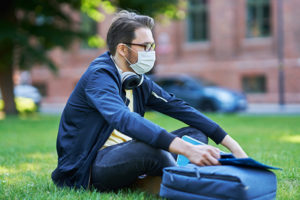
Sending a kid off to college? Some things a parent should consider
As a parent sending a college-age kid off to college, do you know what to send with them to help keep them safe during the novel coronavirus (COVID-19) pandemic?
Or what things should you be hyper in tune with when talking with and checking in with your child as their life on campus gets underway?
Jessica Higgs, MD, director of Health Services at Bradley University and a member of the medical staff at OSF HealthCare Saint Francis Medical Center in Peoria, offers some guidance for parents.
Q. What would you advise parents with children heading off to college?
A. Follow the guidance and recommendations of the college, the community, the state, and the Centers for Disease Control and Prevention (CDC). They have been working all summer on how to open this fall. Decide what you feel comfortable with. If one case of COVID-19 on campus is going to be too many, then it may be best to sit this year out or take online classes if that is an option.

Colleges have done what they can to minimize the risk, but not one college can say there is no risk. There will be cases and even small outbreaks on campus. How schools can mitigate risk and stop the spread is the key to a successful fall.
There’s so much learning that happens on a college campus that occurs outside the classroom. The interactions and relationships you develop with your faculty and classmates, developing your own daily schedule, dealing with conflict, and living independently with a built-in safety net of the campus community, are just a few of those things.
It is for these benefits and many others that colleges have decided that re-opening is worth the risk. However, everyone has to determine their comfort level with different levels of risk and make the decision that is best for them.
Q. What items should parents be sure to send to college with their kids?
A. Masks, a thermometer and a small medical kit.
Masking is a medical recommendation that should be followed. We know that face coverings limit the amount of respiratory droplets that make it into the air, and current data suggests this limits the spread of the virus.
A thermometer because, speaking from 13 years of experience in college health, students are terrible at being able to say whether they did or did not have a fever. Since one of the only signs of COVID-19 that we can measure is a temperature, knowing the actual number helps with triage and helps them make decisions. Students often wake up in a sweat and automatically assume they broke a fever, not taking into account potential other reasons they are sweaty, such as room temp, number of covers, etc.
I also always recommend packing a small medical kit for your student. Items such as bandages, Tylenol, ibuprofen, Benadryl and hydrocortisone cream are all things you usually have in your medicine cabinet at home but don’t think about packing as students head off to school.
Q. What other things should parents be concerned with or aware of regarding their child?
A. A huge concern we all have – besides the physical health of our students – is the mental health of our students. Colleges have already been experiencing a surge in mental health issues over the last few years.

But add on six months of social isolation, increased uncertainty, adjustment to a new environment that also is adjusting to a new situation and the other societal issues that have arisen during this pandemic – all of this may potentially add fuel to the already burning fire.
Students should be aware of services their campus provides and use them if needed. Parents should check in with their students and ask open-ended questions to see how they are dealing with the situation.
Parents may not be dealing that well with everything themselves and being open about how they are coping can help a student see these feelings are normal. It is OK to be scared, anxious, alarmed, angry and confused. We are all getting through these crazy times as best as we can.
Q. Any resources you recommend parents turn to for information?
A. We all know there is a lot of information out there. I would encourage parents to check their sources to make sure it is reliable.
A group I am associated with, the American College Health Association, has a lot information available online. Not all of this is directed at parents, but it can help them understand how colleges make some of these decisions.
Other organizations such as the American Academy of Pediatrics, and the American Medical Society of Sports Medicine, can also provide information regarding students and student-athletes.
Finally, the CDC has a lot of beneficial information.
More advice
Read more advice from Dr. Higgs for parents sending their college-age kids off to school during a pandemic.